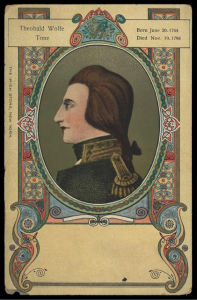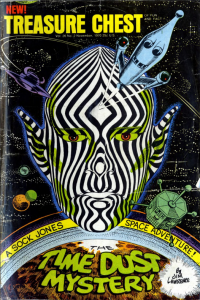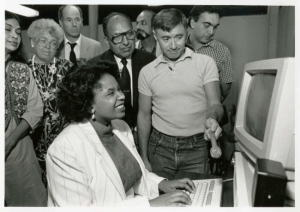
All you need is a computer–heck, all you need is a smartphone to do historical research these days. Three years ago, my colleague John Shepherd described our efforts in boutique digitization, which offered digital researchers several carefully selected sets of digital materials for use online. Since then, we have undertaken many more large-scale digitization projects for your historical edification.
As of March 2018, the Archives hosts 42 collections online amounting to hundreds of thousands of pages of materials. I should note at the outset that the word “collection” is used deliberately here. A “collection” is a set of digital objects put on the web without any kind of accompanying interpretive information. This is in contrast with our online digital “exhibits” and digital “educational resources,” but these are distinguished from collections, as they are interpretively selected and posted with particular audiences in mind (say, high school students and teachers).
In sum, our digital collections are put online with only basic identification information (archivists call this metadata; at its sparest this means the date, collection, creator and search tags are posted with the object). Contrary to what many people believe today, we cannot digitize everything in our archive—it would take years to digitize the millions of objects in our collections and frankly, we don’t have the staff time or the server space for such a project! This means that we must make decisions on what we decide to digitize. Key factors in our decision to digitize collection materials include fragility, demand, and historical import.

Fragility was a key factor in one of our first digitization projects, that of the Fenian Brotherhood. Established in Ireland in 1858 as the Irish Republican Brotherhood, their American branch was known by 1859 as the ‘Fenians,’ with the avowed purpose of overthrowing British rule in Ireland and establishing an Irish Republic. The Fenians in the United States grew to include over 50,000 members and hundreds of thousands of sympathizers by the end of the Civil War. However, rocked by internal factionalism and opposed by the formidable military power of the British Empire, they never came close to achieving their aims. We chose to digitize this collection in 2003 due in part to its fragility. It is well-used and much of the paper in collection is thin and extremely fragile. Hence, digitizing the Fenian Brotherhood collection is partly a preservation measure—the fewer hands that touch the actual materials, the longer it will last. The online collection is still widely used and freely available to anyone with an internet connection; it is our third most used digital collection.
You may be wondering, hmmm, if that fancy set of papers is number three, what is the Archives’ most popular digital collection? Well, that would be The Treasure Chest of Fun and Fact, of course. Treasure Chest was an American Catholic comic book published from 1946 through 1972, available exclusively in Catholic schools throughout the United States. We digitized the Treasure Chest back in 2004 because we suspected that a Catholic comic book would be appealing to many audiences, though it too has its fragile aspects, comic books tend to have thin pages that tear easily, so that was also a factor. Treasure Chest has consistently been a chart topper as far as online use.

As noted, we have many digital collections available for public use online. These collections were digitized and made available for free through the joint efforts of the Archives and the Washington Research Libraries Consortium. Using another model, the Archives teamed up with the ProQuest History Vault to digitize several collections related to U.S. labor history, an area where our materials are particularly strong. ProQuest curates an archive of billions of vetted, indexed documents connected through a variety of research communities. Debuting in 2011, the ProQuest History Vault is constantly adding new primary sources related to widely studied topics in American history. A particular strength is social movements, especially racial justice, women’s rights, and organized labor. The collections, with enhanced search features, can be purchased as a perpetual archive or as a subscription, providing research access for students and faculty to materials held at geographically dispersed archives. The Terence Powderly, John W. Hayes, and John Mitchell papers are part of the module, ‘Labor Unions in the U.S., 1862-1974: Knights of Labor, AFL, CIO, and AFL-CIO,’ which include collections from the University of Maryland and the Wisconsin Historical Society as well as the Catholic University Archives.
